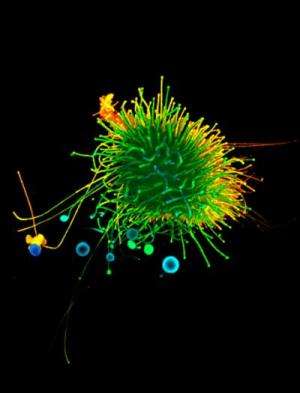Cell sugar concentrations affect hyaluronan production and cancer growth

According to a recent University of Eastern Finland (UEF) study, elevated cell sugar concentrations increase the production of hyaluronan which, in turn, promotes cancer growth. Regulating the production of hyaluronan may be a way to prevent the spreading of cancer.
Hyaluronan is a long, linear carbohydrate polymer present in the human body.. It forms a coating on the surface of many cells and plays a key role in fetal development and in the maintenance of normal tissue balance. Under normal circumstances, hyaluronan promotes tissue healing; however, it can also maintain inflammation and promote the growth of cancer cells. Due to its high water retention capacity, hyaluronan is widely used in cosmetics and also in the medical sector, for example in the treatment of osteoarthritis symptoms and in eye surgery. Hyaluronan injected into the human body for treatment purposes is not associated with cancer risk.
Cells produce hyaluronan with the help of three cell membrane enzymes (HAS1, HAS2 and HAS3), and the production process also needs glucose derivatives.
Hyaluronan synthase 1, i.e. the HAS1 enzyme, is the least well known of the hyaluronan-producing enzymes, and yet its role in cancer malignity seems to be greater than previously thought. Published in Journal of Biological Chemistry, the UEF study showed that HAS1 requires a higher sugar concentration for the production of hyaluronan than HAS2 and HAS3. This finding may be significant for fighting cancer, as cancer cells are known to thrive on blood glucose. Increased glucose levels can lead to increased production of hyaluronan which, in turn, promotes cancer growth. Increased hyaluronan levels have also been found in diabetics with increased blood sugar levels. Diabetics are known to have a higher risk for breast cancer.
HAS1 also plays a significant role in inflammation, because growth factors associated with inflammation mediation, e.g., interleukins, can increase its activeness. This finding constituted part of the doctoral study of Lic. Med. Hanna Siiskonen, which was recently examined at the University of Eastern Finland.
By regulating hyaluronan levels, it may be possible to prevent the progression of cancer and other pathologies. The first clinical trials involving enzymes which break down hyaluronan have been able to slow down the growth and movement of cancer cells and to enhance the effectiveness of cancer drugs.
More information: www.uef.fi/biolaaketiede/ha














